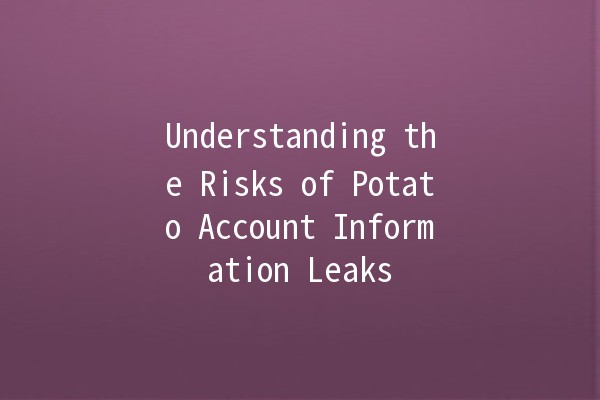Potato, known for its engaging digital services, has gained user popularity. However, with every digital platform comes the challenge of account security and potential information leaks. In this article, we’ll explore the hazards associated with Potato account information leaks and provide practical tips to bolster your security.
Before diving into the specifics, it’s vital to understand why account security matters. An account leak can have dire consequences, not just for individual users but also for the larger community. When attackers gain access to accounts, they can misuse personal data, leading to identity theft, financial losses, and privacy invasions. Therefore, ensuring the security of your Potato account is of utmost importance.
Key Statistics

A study by cybersecurity experts revealed that over 55% of individuals have experienced some form of credential hacking.
It is estimated that identity theft costs victims around $16 billion annually.
2.1 Phishing Attacks
One of the most common methods of data breach is phishing, where attackers impersonate legitimate services.
Example: Users might receive an email resembling a notification from Potato requesting to “verify account information.” By clicking the link and entering details, the user unknowingly hands over their credentials.
2.2 Weak Password Practices
Many users fail to employ strong password strategies. The use of easily guessable passwords or the same password across multiple platforms dramatically increases vulnerability.
Tip: Use a mix of uppercase and lowercase letters, numbers, and symbols to create complex passwords.
2.3 Public WiFi Risks
Accessing your Potato account over public WiFi networks can compromise your security, as hackers can intercept data.
Example: Using a public network at a café without a VPN can put your account credentials at risk.
3.1 Utilize TwoFactor Authentication (2FA)
What It Is: TwoFactor Authentication adds an extra layer of security by requiring not just a password but also a second method of verification (e.g., a text message code).
Application: To enable 2FA on your Potato account, go into the security settings and link your mobile number for SMS codes.
3.2 Regularly Update Your Passwords
Why It Matters: Regularly changing passwords minimizes the risk of account hacks.
How to Apply: Set a reminder every few months to update your Potato password.
3.3 Monitor Account Activity
What to Do: Regularly check your account for any suspicious activity.
Implementation Tip: Potato accounts have a section to review recent login activities. Familiarize yourself with it and report any unknown logins immediately.
3.4 Be Wary of Suspicious Links
Advice: Always check for the legitimacy of links before clicking.
Application Example: If a link appears suspicious, hover over it to preview the URL.
3.5 Keep Software Updated
Keeping your device’s software and applications uptodate can protect you from known vulnerabilities.
Recommendation: Enable automatic updates for your apps, including security patches for your device.
In the battle against information leaks, user education plays a crucial role. Companies like Potato can only do so much in safeguarding information; thus, users must remain vigilant.
Key Education Points
Understand how to recognize phishing attempts.
Be aware of the importance of device and network security.
5.1 What Should I Do If My Potato Account Is Compromised?
If you suspect that your account has been breached, immediately change your password and enable twofactor authentication. Additionally, check your account settings for any unauthorized changes.
5.2 How Does Potato Protect My Information?
Potato employs various security measures, including encryption and monitoring for suspicious activity. However, it's essential for users to take proactive steps as well.
5.3 Can I Recover My Account If I Forget My Password?
Yes, Potato provides a password recovery option on the login page. You will need access to the email linked to your account to reset your password.
5.4 What Is the Importance of Unique Passwords for Different Accounts?
Using unique passwords ensures that if one account is compromised, the security of others remains intact. This practice significantly reduces the risk of a full account takeover.
5.5 Should I Use a Password Manager?
Yes, a password manager can help store and manage your passwords securely, making it easier to use complex and unique passwords without the need to remember each one.
5.6 How Often Should I Change My Password?
It’s recommended to change your passwords every 3 to 6 months and immediately after any suspected breach.
In a digital world, the risk of information leaks is everpresent. By implementing robust security measures and maintaining a vigilant mindset about potential threats, users can significantly reduce their exposure to risks related to Potato account information leaks. Always prioritize your online security and stay informed about new threats.
As a community, it’s essential for us to share knowledge and best practices to safeguard not only our accounts but also the integrity of the digital services we cherish and rely upon. Investing time and effort in understanding and implementing these security tips can make a significant difference in protecting your Potato account information. Stay safe online!